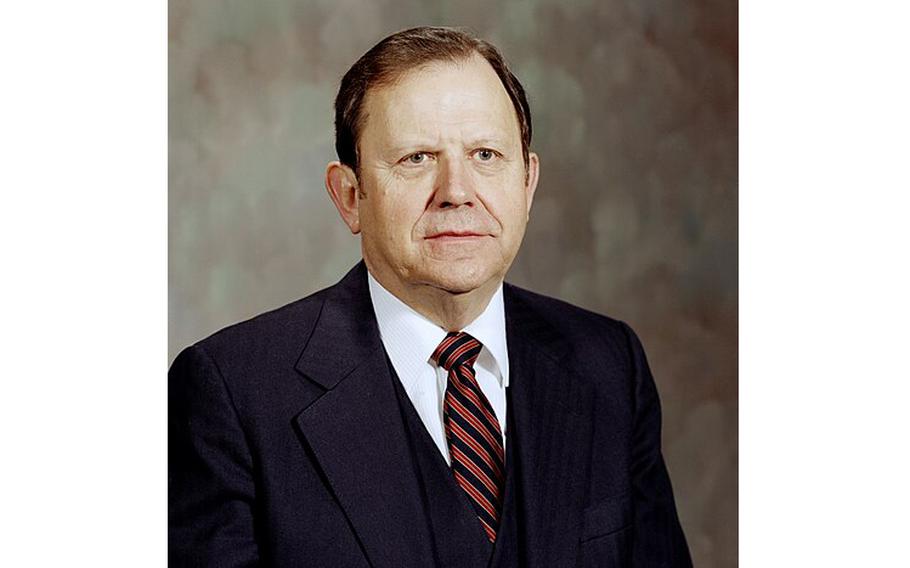
William R. Lucas, who directed the Marshall Space Flight Center from a crucial time of expansion into one of its darkest hours, died Feb. 10, 2025, at his home in Huntsville. He was 102. (NASA)
(Tribune News Service) — William R. Lucas, who directed the Marshall Space Flight Center from a crucial time of expansion into one of its darkest hours, died Feb. 10, 2025, at his home in Huntsville. He was 102.
Lucas served as the fourth director of the Huntsville-based space flight center, from June 1974 to July 1986. According to his biography on the NASA website, Lucas “was instrumental in bringing to Marshall a significant share of the nation’s major space programs.”
Marshall Space Flight Center also came to control three of the primary elements of the space shuttle: the main engines on the orbiter, the twin solid rocket boosters and the external fuel tank. Those elements — and the climate at Marshall under Lucas’ direction — came under intense scrutiny when the space shuttle orbiter Challenger exploded Jan. 28, 1986, shortly after launch from Cape Canaveral, Fla.
President Ronald Reagan immediately appointed a commission to investigate and report on the circumstances that led up to the loss of the Challenger. The Rogers Commission report of June 6, 1986, faulted both NASA as a whole and the Marshall Space Flight Center, as well as contractor Morton Thiokol Inc., over lapses in engineering and management.
Regarding MSFC, the commission’s report noted, “a tendency at Marshall to management isolation,” which allowed program managers to “fail to provide full and timely information bearing on the safety of [the Challenger] flight to other vital elements of Shuttle program management.”
Lucas retired in the face of criticism the following month.
Born March 1, 1922, in Newbern, Dyer County, Tenn., Lucas enlisted in the U.S. Navy in 1943 and served as a supply corps officer in the U.S., the Caribbean and the Pacific theater during World War II. He was discharged from active duty in 1946 and served in the Naval Reserves. He earned a doctoral degree in chemistry and metallurgy from Vanderbilt University in 1952 and began his career at Redstone Arsenal in the Guided Missile Development Division under the direction of Wernher von Braun.
Earlier in his NASA career, Lucas helped design the passive thermal control system for the first U.S. satellite, Explorer I, which was launched by a Huntsville team using a Jupiter rocket in 1958, according to his NASA biography. And as director of Marshall’s Propulsion and Vehicle Engineering Laboratory, he led the development of the Saturn V launch vehicle’s propulsion system.
Lucas’ honors included election to the National Academy of Engineering and the Alabama Engineering Hall of Fame; the 2009 Wernher von Braun Space Flight Trophy from the National Space Club for his distinguished career in rocketry and science; a NASA exceptional service medal for his contributions to the Apollo 11 lunar landing mission and a NASA distinguished service medal, “for an exceptional career of dedicated public service,” according to his obituary.
Lucas was a fellow of the American Institute of Aeronautics, the American Society of Metals, and the American Astronomical Society; and a member of the American Chemical Society, the American Institute of Aeronautics and Astronautics (AIAA), Sigma Xi, and Tau Beta Pi.
Lucas’ wife of 69 years, Polly Jean Torti Lucas; a son, William Ray Lucas Jr.; and his sister, Sue Lucas Moore, predeceased him. He is survived by his daughter, Donna Lucas Watts, and son Michael Lee Lucas, along with six grandchildren and 13 great-grandchildren.
Visitation will be held March 1 at 10 a.m. at First Baptist Church, Huntsville, followed by a funeral service at 11 a.m. A private family graveside service will be held at Maple Hill Cemetery.
©2025 Advance Local Media LLC.
Visit al.com.
Distributed by Tribune Content Agency, LLC.